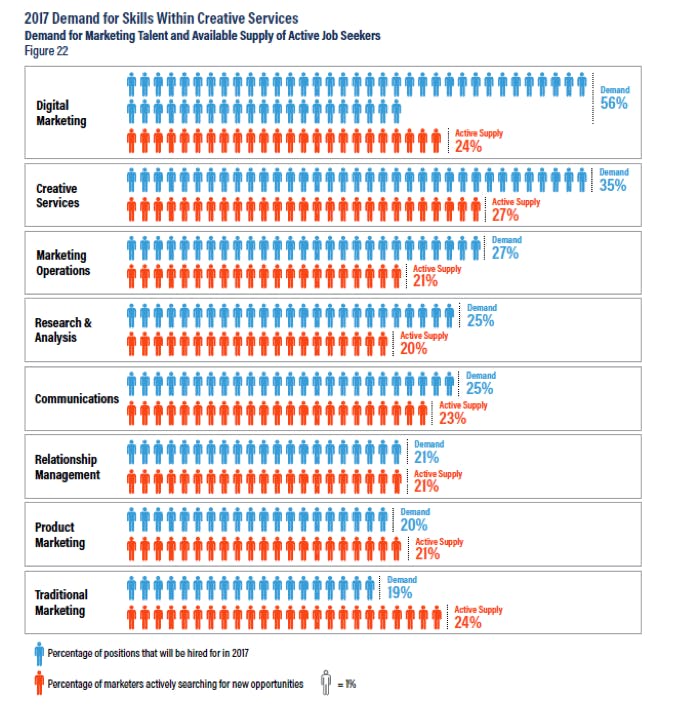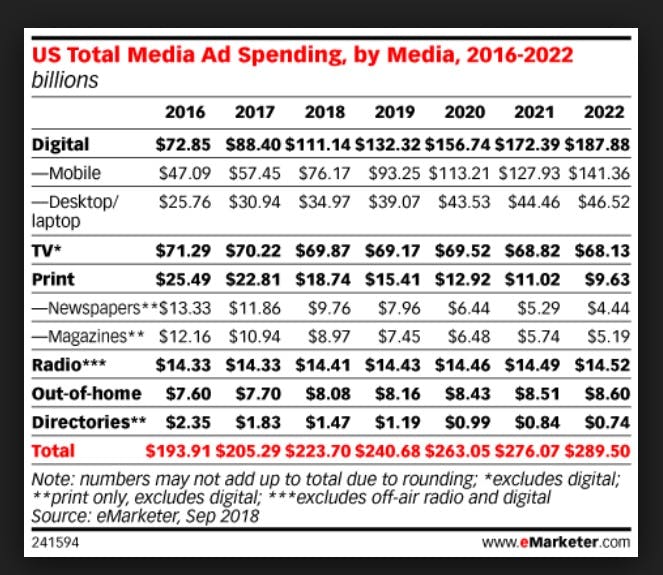Marketing is a traditional industry as the need to spread awareness, make people aware of products or services has been around for as long as capitalism itself.
In today's economy, marketing has become a very sophisticated, complex, and ever-evolving industry. It’s something that every business relies on and there's no question in anyone's mind that if you want a successful business, you need a strong marketing presence.
For those in the education sector, this presents great opportunities. As marketing becomes more complex and specialized, it's a skill that needs to be continuously nurtured and cultivated making a comprehensive digital marketing education crucial for professionals across industries.
In this article, we explore the evolution of marketing and the growing demand in the marketplace.
Does Market Demand Exist?

The first question any organization needs to ask is if there is any kind of sizable demand for digital marketing education in digital marketing? Is there a need in the workforce for people who are trained in this field? While sectors such as medicine, engineering, and law have decades of proven demand, digital marketing is a relatively new field.
Regardless of digital marketing’s age, the answer to that question is “yes.” Even taking the digital aspect out of the equation, the general field of marketing has a sizable spectrum of demand. Public relations, brand management, and of course, traditional advertising like television and radio commercials and print ads are still important parts of the industry.
When you add the digital component to this equation, the actual demand for marketing jumps up by orders of magnitude. In fact, current estimates say that the demand for digital marketing specialists outstrips the currently available supply, with 56% of the companies in one survey saying they needed people with digital marketing expertise.
With that type of demand, it is simply impossible for the existing job pool to meet current needs. New blood is needed. But where do businesses get it? They can get it from a qualified group of graduates or even their own employees, as long as the person has undergone substantial digital marketing training and education.
Digital Marketing is a Global Phenomenon
One of the most interesting things about the market demand for digital marketing is that this demand is universal. While there’s obviously job opportunities in this field in the United States, that is far from the only country where such skills would make a person a desirable hire.
The list of potential countries with a high annual salary for people with digital marketing training and expertise are:
- Australia: $44,000 for entry-level positions, up to $87,000 for senior.
- Netherlands: $38,000 for entry-level, and $65,000 for senior.
- USA: $35,000 for entry-level, with $64,000 for senior.
But of course, while that’s the top three, there are plenty of other regions like Canada, the United Kingdom, and even Singapore that are placing increased importance on securing staff with education in digital marketing.
But why is this demand growing? What is it about digital marketing training that makes it such an “exportable” skill to so many different parts of the world?
Digital Marketing is Growing in Relevance

The relevance of digital marketing continues to grow, with over $111 billion spent on advertising. By 2019 that figure is estimated to account for 55% of total media ad spend.
The biggest reason for this growth is the migration of the market. More and more people are spending their time using internet-connected devices like smartphones or desktop and laptop computers, rather than watching broadcast television or free-to-air radio. At the same time, traditional print ad venues such as magazines and newspapers are experiencing contractions in their audience. It’s not that people have stopped consuming media, they’ve simply decreased their consumption of traditional media and moved onto digital, online platforms.
So, the traditional career route for a marketer of joining a large established advertising agency is changing. More and more businesses are taking advantage of the smaller, more approachable and customizable nature of digital marketing. They might choose smaller or more nimble agencies that give them the attention they need. Or managers might bypass ad agencies entirely and hire their own in-house marketers.
More often than not, people now talk about something they saw on Twitter or Facebook, not on a commercial in last night’s latest episode of a popular television series. Digital marketing is rapidly passing traditional marketing in importance and audience reach, and more and more businesses need specialists in this industry so that they can be where the customers are.
Digital Marketing is Diverse & Education Must Be Too
There’s more to digital marketing than just having an instinct for smart promotion or coming up with an enticing slogan or striking ad concept. Good digital marketing training doesn’t just focus on marketing; it embraces all things digital.
Advertising in the digital era provides massive, global reach, but it is not simple to achieve. The algorithms social media uses to find popular topics, the optimization of content so that search engines can more easily find it, and the multi-media nature of the digital landscape means that there’s a surprising amount of technical proficiency employees need.
The most compelling sales content in the world does no one any good if it’s hard to find on the internet or created in such a way that search engines actually ignore it. Digital marketing is far from a straight transference of advertising skills to a digital platform.
It demands an understanding of the parameters of search algorithms, paid ad techniques, what content inspires consumers, and more. As such, digital marketing education, whether from a school or business-developed program, needs to cover these topics and skills.
Change Is a Constant, So Frequent Updates Are a Must
Perhaps one of the most important points to keep in mind about digital marketing training is that this is not a static discipline. New technologies are always developing, so there’s always a cutting edge to the technical side. One example is the algorithms that Google uses to rank content. These algorithms are being tweaked regularly, so what works well in 2019 may no longer be as important or as crucial in 2022. Marketers need to realize that education isn’t over once they get their degree. Digital marketing is in a constant “arms race” as better techniques and tools are invented.
But even more crucially, fashions change. If digital marketing had been as important 15 years ago, marketing experts would have been focused on MySpace. Today, marketing focuses on Twitter and Instagram, as the dominance of Facebook gradually erodes in favour of the platforms preferred by millennials and Generation Z.
In other words, new social media platforms and algorithms will come and go. That means there will always be something new to learn or a program to adjust to. As the demographics change, and new technologies emerge, so too will new digital marketing possibilities for people willing to experiment, innovate, and gain the first-mover advantage by pioneering these spaces.
Digital Marketing Is a Growth Industry
Developed nations have moved past the point of being industrial-based, manufacturing economies. The forces that move modern nations are services and technology. The growth of the internet has made digital marketing not just a local concern but a global one as well. Digital marketing will continue to grow as the audience, the market, and businesses increasingly put their attention on the digital space.
Unlike some professions that are threatened by automation, digital marketing is something that machines simply cannot do. There’s a certain amount of “future-proofing” built into this career that ensures that students looking to graduate and enter the workforce will have viable career tracks open to them.
For professionals already established in their careers, digital marketing education is needed to keep up with competitors. Companies can add value to existing employees by expanding their skill set and providing them with the skills and knowledge they need to thrive in the company and to help the business maintain an important marketing presence in a changing digital landscape.
Conclusion
“The skills are in demand and businesses are wanting to power their marketing efforts by strengthening their digital marketing offering” – Mark Ashbridge, General Manager of The Left Bank
Digital marketing is not going to go away. In fact, digital marketing is only going to grow in importance for all businesses. The demand for people with digital marketing training is already at the point where there’s a deficit of qualified personnel.
Organizations and educational institutions that have the foresight to develop strong programs and train people in this area are a critical need.













No comments:
Post a Comment